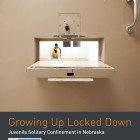
Solitary Reform Shows Power of Brain Science to Change Policy
|
Compelling brain science is finally starting to make its way into the formation of policies — and we need to keep it going.
Juvenile Justice Information Exchange (https://jjie.org/series/juvenile-solitary-confinement/page/4/)

Compelling brain science is finally starting to make its way into the formation of policies — and we need to keep it going.

Prolonged isolation has the potential to leave a permanent scar on many individuals, especially juveniles. It is thus time to reconsider the use of solitary confinement in state prisons and jails.

Lately I’ve read so many articles on juvenile and criminal justice reform laws being passed it’s surreal. The truth is, hardly any kids will be directly impacted by this because there are practically no juveniles in federal prisons. I can’t dwell on this but need to keep working on more reforms.

One important aspect of the discussion of the solitary confinement of youth that has received little attention is the role of race and socioeconomic status. Research has demonstrated that young people of color — like Kalief Browder — are more likely to be placed in the juvenile and adult court systems, to remain in them longer and to experience more punitive sanctions than whites.

WASHINGTON — A new ban on solitary confinement for juveniles in federal prison could bring momentum to reform efforts on the state level.

In a historic moment Monday, President Obama used his executive authority to end the use of solitary confinement for youth in the federal prison system.

The solitary confinement policies for youth vary widely in Nebraska, with stays of weeks and even months permitted in some facilities, says a new report from the ACLU of Nebraska.

Each year, thousands of children are subjected to solitary confinement in juvenile facilities and adult jails and prisons. Solitary confinement — also known as room confinement, seclusion, isolation or segregation — is the involuntary placement of a youth alone in a cell, room or other area for any reason.

She was 11 and in the sixth grade when she went to jail, eventually landing in solitary confinement. Nicole never imagined a petty fight at her Louisiana middle school would lead to years behind bars.
WASHINGTON — A criminal justice reform bill with several provisions to help juveniles in prison and ease re-entry into the community cleared the Senate Judiciary Committee today.